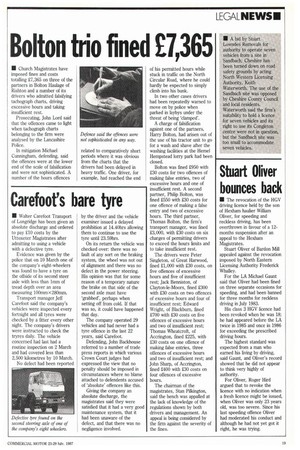Carefoot's bare tyre
Page 21

If you've noticed an error in this article please click here to report it so we can fix it.
• Walter Carefoot Transport of Longridge has been given an absolute discharge and ordered to pay £10 costs by the Uttoxeter Magistrates after admitting to using a vehicle with a defective tyre.
Evidence was given by the police that on 10 March one of the company's eight-wheelers was found to have a tyre on the offside of its second steer axle with less than lmm of tread depth over an area measuring 100mm x 280rnm.
Transport manager Jeff Carefoot said the company's vehicles were inspected every fortnight and all tyres were checked by a fitter every other night. The company's drivers were instructed to check the tryres daily. The vehicle concerned had last had a routine inspection on 2 March and had covered less than 2,500 kilometres by 10 March.
No defect had been reported by the driver and the vehicle examiner issued a delayed prohibition at 14.40hrs allowing them to continue to use the tyre until 23.59hrs.
On its return the vehicle was checked over: there was no fault of any sort on the braking system, the wheel was not out of alignment and there was no defect in the power steering. His opinion was that for some reason of a temporary nature the brake on that side of the second axle must have 'grabbed', perhaps when setting off from cold. If that was so, it could have happened that day.
The company operated 29 vehicles and had never had a tyre offence in the last 22 years, said Carefoot.
Defending, John Backhouse referred to a number of trade press reports in which various Crown Court judges had expressed the view that no penalty should be imposed in circumstances where no blame attached to defendents accused of 'absolute' offences like this.
Giving the company an absolute discharge, the magistrates said they were satisfied that it had a very good maintenance system, that it had been unaware of the defect, and that there was no negligence involved.




















































































